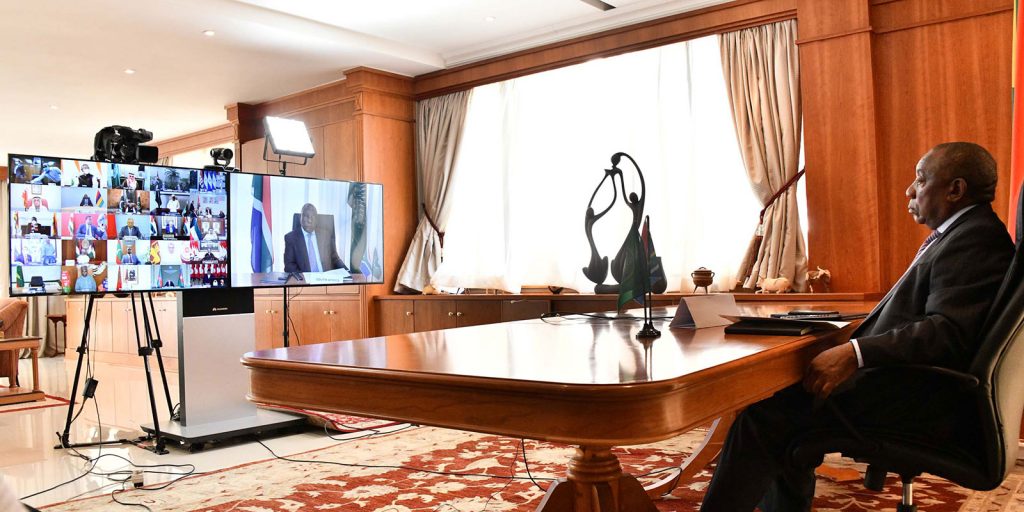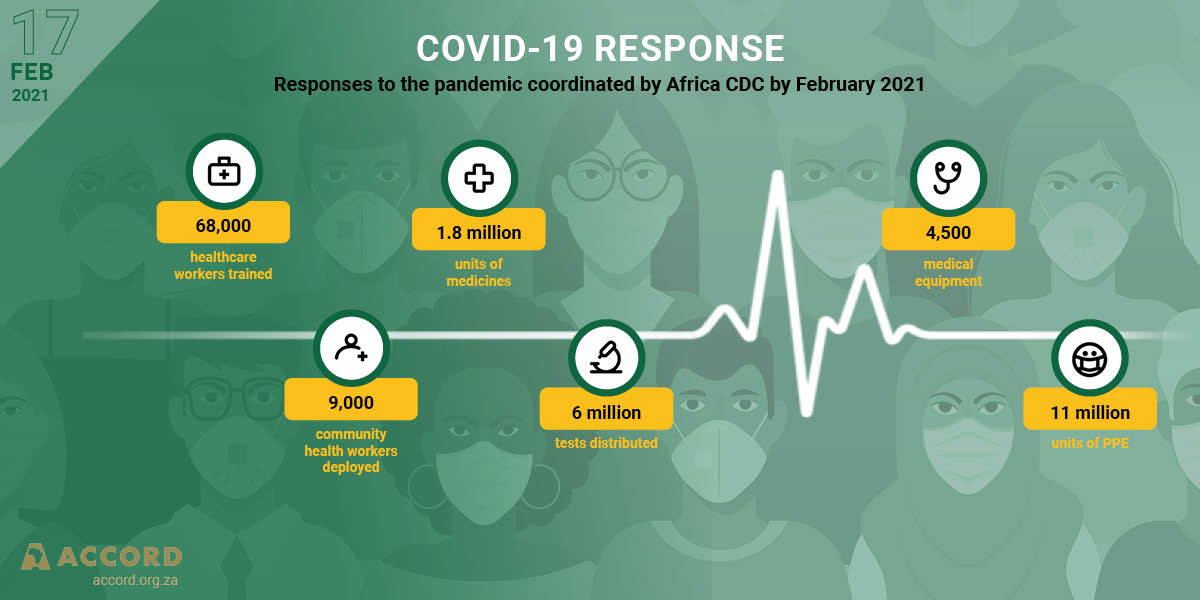The Summit’s annual theme, “Arts, Culture and Heritage: Levers for Building the Africa We Want,” which was decided last year, has been overshadowed by the imperatives to complete the reform of the Union and to deal with the ongoing COVID-19 pandemic. The Summit reviewed and approved a comprehensive report of the Africa Centres for Disease Control and Prevention (Africa CDC) that includes crucial strategic continental actions in response to the pandemic, especially the need for equitable and timely access to the COVID-19 vaccine for all AU Member States to ensure that at least 60% of the continent’s population is vaccinated. In respect of the reform of the Union, the election of the Commission’s new leadership has been a big step forward.
By combining @AUC_DPA & @AU_PSD, a reformed #AU has an opportunity to work on the root causes of the conflicts and not just react to the conflicts when they occur @Assodesire
Tweet
New Leadership Team
The first leadership team of the restructured African Union Commission, was elected for a 4-year term as follows:
- Chairperson: Mr. Moussa Faki Mahamat (re-elected) from Chad;
- Deputy Chairperson: Ms. Monique Nsanzabaganwa from Rwanda;
- Commissioner for Agriculture, Rural Development, Blue Economy and Sustainable Environment: Ms. Josefa Sacko (re-elected) from Angola;
- Commissioner for Economic Development, Trade and Industry, and Mining: Mr. Albert Muchanga (re-elected) from Zambia;
- Commissioner for Infrastructure and Energy: Ms. Amani Abou-Zeid (re-elected) from Egypt; and
- Commissioner for Political Affairs, Peace and Security: Mr. Bankole Adeoye from Nigeria.
The election of the Commissioner for Health, Humanitarian Affairs, and Social Development, and that of the Commissioner for Education, Science, Technology, and Innovation has been postponed for about six months because the candidates have been automatically disqualified due to the strict AU policy aiming to ensure gender parity and geographical balance within the whole leadership of the Commission.

So far, four of the six positions have been retained by the incumbents. Only the Deputy Chairperson and the Commissioner for Political Affairs, Peace and Security are new to the Team. However, it is worth noting on the one hand that Moussa Faki Mahamat becomes the first Chairperson of the AU Commission to be elected for a second consecutive term to this politically sensitive yet very coveted position since the transformation of the Organisation of African Unity (OAU) to the AU almost 20 years ago. His election by 51 out of 55 countries is also unprecedented. It is indicative of overriding consensus and political support of what he undertook to do over the next four years, with a strong emphasis on silencing the guns to ensure a peaceful and secure continent in order to pave the way for economic development.
The @_AfricanUnion should introduce innovative mechanisms and tools to hold Member States accountable for the implementation of the #SilencingtheGuns roadmap and targets @Assodesire
Tweet
Change or Continuity: How Best to Silence the Guns as a Prerequisite for Africa’s Development?
On the other hand, the new “super-department” of Political Affairs, Peace and Security, which is the merging of two different and previously existing departments, has been given to the Nigerian diplomat Ambassador Bankole Adeoye who, not only represented his country in the AU for several years among other high-level functions but, has been one of the most active players within the Peace and Security Council of the AU, a body to which Nigeria has become a de-facto “permanent member” under a non-written agreement of the Economic Community of West African States (ECOWAS) countries. Amb. Bankole’s score of 55/55 votes is another indicator from Member States that peace, security and governance should be among the top thematic priorities to be dealt with urgently. The newly merged department will be very influential and powerful within the AU. The AU Commissioner has a unique opportunity to effectively work on the root causes of the conflicts and not just react to the conflicts when they occur with their already devastating consequences and implications. That connection has been missing in the previous setting and operational model of the AU Commission.
However, to deal with the ongoing conflicts and prevent new ones from starting, the AU should start doing business differently. We need to invest considerably in mechanisms to tackle the long term and profound threats and causes of conflicts, including governance deficits, disputed elections, gross human rights abuses, severe inequality, the mismanagement of natural resources, and the failure to deal with diversity in our countries. If these issues are properly handled with a comprehensive and proactive approach, the need to deploy peace support operations, a very costly and complicated exercise, will no longer be the obvious way of dealing with conflicts in Africa. For this to happen consistently, the new leadership should set up a certain accountability mechanism vis-a-vis Member States so that progress can be monitored, and problems identified and dealt with where they occur. The AU does not need new policies to make these happen. We already have very progressive frameworks and standards on which have been established and approved in relation to such matters. Instead, the Commission should introduce innovative mechanisms and tools to hold Member States accountable on the implementation of what they have adopted in terms of shared values. Perhaps, the AU should consider naming a Head of State or a group of Heads of State to be the moral and political anchor for the Silencing the Guns in Africa target that has now been moved from 2020 to 2030.
Désiré Assogbavi is an international law specialist and expert on Pan African institutions and politics. In the framework of the AU Master Roadmap to Silencing the Guns in Africa, he has made series of submissions to the Peace and Security Council. They can be read here.


